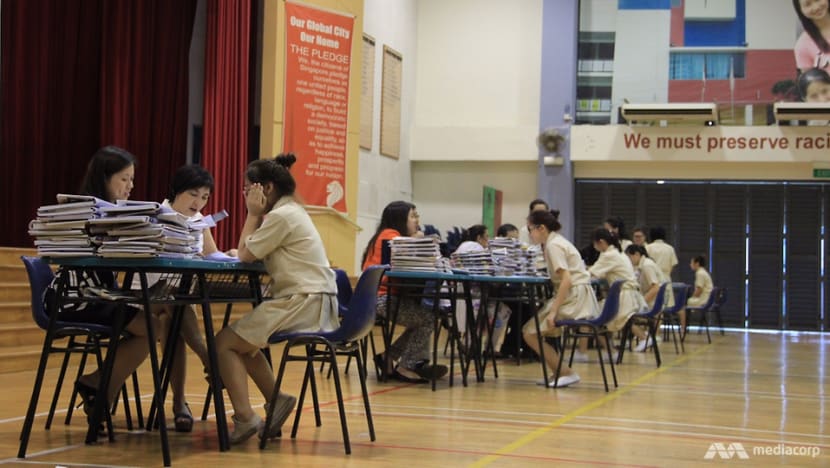Commentary: What next after O-Levels? The most practical answer may not be the right one
For all the action taken to reduce a national emphasis on grades, exams and “practical” subject choices still matter in Singapore, says Friedel Wong.

File photo of students receiving their GCE O-Level results. (File photo: Marcus Mark Ramos)
SINGAPORE: Singapore’s education system has long been defined by national examinations. Results day – as it is on Thursday (Jan 12) for students who took their O-Levels in 2022 – is always a momentous occasion. Those letters on the slip determine a student’s next steps in their academic journey, which in turn could influence their career progression years down the road.
However, Singapore is reckoning with the pressures such a system imposes on students. Deputy Prime Minister Lawrence Wong, in launching the Forward Singapore exercise, laid out a vision for a nation “that values and celebrates all individuals for who they are and what they can achieve”, and called for a “more open and compassionate meritocracy”.
We have witnessed concrete steps taken in this direction such as reforms to the PSLE grading system, scrapping mid-year examinations and urging employers to look beyond grades.
While these initiatives are a step forward in lessening exam stress for students, they alone are insufficient in widening society’s definition of merit. The presence of national examinations results in grades carrying significant weight in shaping one’s life trajectory.
After all, national exams serve as standardised checkpoints for students to clear. The inability to do so could limit educational and career options. Non-profit co-founder Marvin Kang went through such a reality check when he felt he had nowhere to go after flunking his A-levels.
Because exams still serve as a safety net, the need to perform well – or adequately enough – will always be there. But can we broaden our criteria of what “performing well” means in Singapore’s education system?
PRACTICAL CHOICES REIGN SUPREME
I distinctly remember the sense of uncertainty I felt in secondary school when I chose to enter the humanities stream as opposed to the science stream. The common consensus is that going into arts might limit career options.
The uncertainty I felt reflects how “practical” subject choices in Singapore still matter – that is, subjects that maximise one’s professional standing. O-Level graduates may now be grappling with this question in choosing which course or subject combination to pursue next. What would curry the most favour with a university admission officer or a job recruiter?
But this thinking can make students deny their own strengths and choose the path well-travelled instead. By choosing to study what I was inclined towards, I did better in junior college and found my passion for behavioural science, which I pursue today as a Sociology undergraduate.
A LACK OF REGARD FOR THOSE IN THE ARTS
Even if more students choose what’s suited for them, the unfortunate truth is that they might not be appreciated for it. Consider the controversy during the “circuit breaker” period in 2020, when a local survey listed being an artist as the topmost non-essential job .
The criticism was swift. Comedian Rishi Budhrani challenged the nation to delete Netflix and Spotify, while artistes like Hossan Leong and Nikki Muller tagged themselves as “proudly non-essential” in tongue-in-cheek social media posts.
The survey finding highlights the presence of a social hierarchy that ranks occupations and individuals by their usefulness. This mindset may be the reason behind – rather than the consequence of – the fact that it’s difficult to carve out a career as an artist in Singapore.
In a 2019 local news report, “naive”, “impulsive”, “passionate” were some of the words bandied about by several young artists to explain why they decided to pursue the arts as a career. They acknowledged the harsh realities of pursuing a career in the arts, like having to work nights and take on odd jobs for a steady stream of income.
Yet they acknowledged that it is getting easier to become a full-time artist in Singapore with better government support, more opportunities enabled by technology and a more welcoming public attitude.
MOVING PAST STEREOTYPICAL MOULDS
How else can we move past narrow-minded conceptions of success?
The solution I am proposing is not scrapping national exams because they help students assess their knowledge and determine individual strengths. Instead, educators, employers and even students themselves need to continue widening their definition of merit to cultivate diverse skillsets.
One way to do this is through better arts education in Singapore. Choral director Mr Nelson Kwei, premier choral director observed the current lack of emphasis on arts education in the local education system as people do not view the arts the same way they do maths and science.
He cited the example of music classes – rather than being part of core curriculum, they are often relegated as remedial classes, and many schools do not have proper music teachers too.
Treating arts subjects as an afterthought limits the potential of individuals with natural talent in the field. The education system needs to make space for students to explore their interests without ranking them.
Students too need to value their unique strengths and ways of learning. Parents should nurture their children’s strengths, not force-fit them into the mould of a Singapore student who excels in academics via rote learning.
Meritocracy is a well-oiled system in Singapore, so these things are easier said than done. But it is up to us to broaden our pathways to success, and to forge them when none exist.
I desire to see a Singapore that enables youths to pursue their passions without doubting themselves as I did. Only then can Singapore truly value and celebrate all individuals for who they are.
Friedel Wong is a third-year sociology student at the National University of Singapore


















